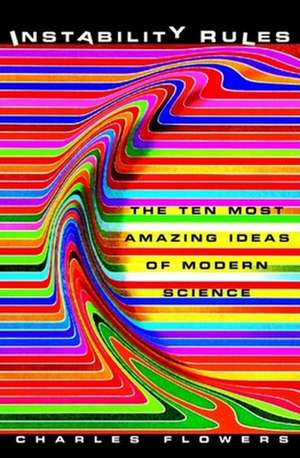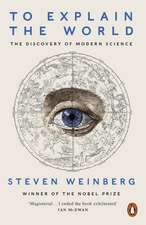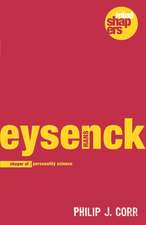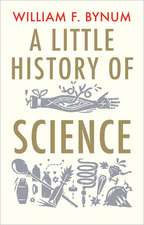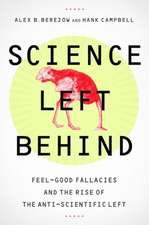Instability Rules: The Ten Most Amazing Ideas of Modern Science
Autor Charles Flowersen Limba Engleză Hardback – 11 apr 2002
Whether probing the farthest reaches of the vast universe or exploring the microscopic world of genetics and the subatomic world of quantum mechanics, Instability Rules is a remarkably informative and engaging look at ten milestone discoveries and their discoverers–a wide range of very human personalities whose insights have dramatically altered our most basic assumptions about human existence during the last century. The stories include Edwin Hubble and the expanding universe, Alfred Wegener and continental drift, Neils Bohr and quantum mechanics, Alan Turing and artificial intelligence, and James Watson and Francis Crick and DNA. Also covering discoveries of the twenty–first century that are already refining these and other ideas, Instability Rules is an exhilarating, sometimes amusing encounter with the defining scientific discoveries of our age.
Preț: 140.82 lei
Nou
Puncte Express: 211
Preț estimativ în valută:
26.95€ • 29.26$ • 22.64£
26.95€ • 29.26$ • 22.64£
Carte disponibilă
Livrare economică 01-15 aprilie
Preluare comenzi: 021 569.72.76
Specificații
ISBN-13: 9780471380429
ISBN-10: 0471380423
Pagini: 240
Dimensiuni: 164 x 243 x 22 mm
Greutate: 0.49 kg
Editura: Wiley (TP)
Colecția John Wiley &Sons
Locul publicării:Hoboken, United States
ISBN-10: 0471380423
Pagini: 240
Dimensiuni: 164 x 243 x 22 mm
Greutate: 0.49 kg
Editura: Wiley (TP)
Colecția John Wiley &Sons
Locul publicării:Hoboken, United States
Public țintă
general readers of trade science and math; some college students in general science classesDescriere
a century of remarkable scientific discovery
"We learned that the continents are forever slipping and sliding around the globe, like clothing on a teenager, and the mountains are forever rising, the oceans widening, the volcanoes stoking their furnaces for the next blast. "
"Our bodies are a fever of change as our minds perpetually rewire themselves and our genes make uncountable decisions, renewing or growing or misfiring to produce the runaway cancers that may kill us, initiating the instability of mortal decay. . . . "
"Within tiny atomic universes, particles pop in and out of being, impossible as that may be to conceive, while atoms collide and meld, buzzing continually in their electrically charged states. "
"This, then, was the truth behind many of the defining discoveries of the twentieth century: existence is constant activity."
–from the Preface
"We learned that the continents are forever slipping and sliding around the globe, like clothing on a teenager, and the mountains are forever rising, the oceans widening, the volcanoes stoking their furnaces for the next blast. "
"Our bodies are a fever of change as our minds perpetually rewire themselves and our genes make uncountable decisions, renewing or growing or misfiring to produce the runaway cancers that may kill us, initiating the instability of mortal decay. . . . "
"Within tiny atomic universes, particles pop in and out of being, impossible as that may be to conceive, while atoms collide and meld, buzzing continually in their electrically charged states. "
"This, then, was the truth behind many of the defining discoveries of the twentieth century: existence is constant activity."
–from the Preface
Textul de pe ultima copertă
a century of remarkable scientific discovery
"We learned that the continents are forever slipping and sliding around the globe, like clothing on a teenager, and the mountains are forever rising, the oceans widening, the volcanoes stoking their furnaces for the next blast. "
"Our bodies are a fever of change as our minds perpetually rewire themselves and our genes make uncountable decisions, renewing or growing or misfiring to produce the runaway cancers that may kill us, initiating the instability of mortal decay. . . . "
"Within tiny atomic universes, particles pop in and out of being, impossible as that may be to conceive, while atoms collide and meld, buzzing continually in their electrically charged states. "
"This, then, was the truth behind many of the defining discoveries of the twentieth century: existence is constant activity."
–from the Preface
"We learned that the continents are forever slipping and sliding around the globe, like clothing on a teenager, and the mountains are forever rising, the oceans widening, the volcanoes stoking their furnaces for the next blast. "
"Our bodies are a fever of change as our minds perpetually rewire themselves and our genes make uncountable decisions, renewing or growing or misfiring to produce the runaway cancers that may kill us, initiating the instability of mortal decay. . . . "
"Within tiny atomic universes, particles pop in and out of being, impossible as that may be to conceive, while atoms collide and meld, buzzing continually in their electrically charged states. "
"This, then, was the truth behind many of the defining discoveries of the twentieth century: existence is constant activity."
–from the Preface
Cuprins
Preface: "It Moves . . . "
1 Hubble and the Expanding Universe.
2 Einstein and the Wonder of Light.
3 Bohr and the Puzzles of the Quantum World.
4 Wegener and the Dance of the Continents.
5 Big Bang, Big Crunch, and Big Bore.
6 Fermat, Godel, and Fuzzy Math.
7 Mendel, Watson, Crick, and the Human Genome.
8 Hominids, Humans, and the Search for Origins.
9 Turing and the Brain as Computer, and Vice Versa.
10 Freud, the Unconscious, and Other Views.
Acknowledgments.
Photo Credits.
Index.
1 Hubble and the Expanding Universe.
2 Einstein and the Wonder of Light.
3 Bohr and the Puzzles of the Quantum World.
4 Wegener and the Dance of the Continents.
5 Big Bang, Big Crunch, and Big Bore.
6 Fermat, Godel, and Fuzzy Math.
7 Mendel, Watson, Crick, and the Human Genome.
8 Hominids, Humans, and the Search for Origins.
9 Turing and the Brain as Computer, and Vice Versa.
10 Freud, the Unconscious, and Other Views.
Acknowledgments.
Photo Credits.
Index.
Recenzii
"...For its clarity and wit, this is a winner..." (New Scientist, 22 June 2002) "...remarkable and engaging..." (Materials World, July 2002)
"...a highly readable account of what Charles Flowers thinks were the most fundamental and far–reaching ideas..." (Chemistry & Industry, February 2004)
"...For its clarity and wit, this is a winner..." (New Scientist, 22 June 2002) "...remarkable and engaging..." (Materials World, July 2002)
"...a highly readable account of what Charles Flowers thinks were the most fundamental and far–reaching ideas..." (Chemistry & Industry, February 2004)
"...a highly readable account of what Charles Flowers thinks were the most fundamental and far–reaching ideas..." (Chemistry & Industry, February 2004)
"...For its clarity and wit, this is a winner..." (New Scientist, 22 June 2002) "...remarkable and engaging..." (Materials World, July 2002)
"...a highly readable account of what Charles Flowers thinks were the most fundamental and far–reaching ideas..." (Chemistry & Industry, February 2004)
Notă biografică
CHARLES FLOWERS is an award–winning author or coauthor of fifty–eight books, most recently Mapping the Stars, The Big Bang (with David Appel), and A Science Odyssey: 100 Years of Discovery, the companion book to the PBS series.
